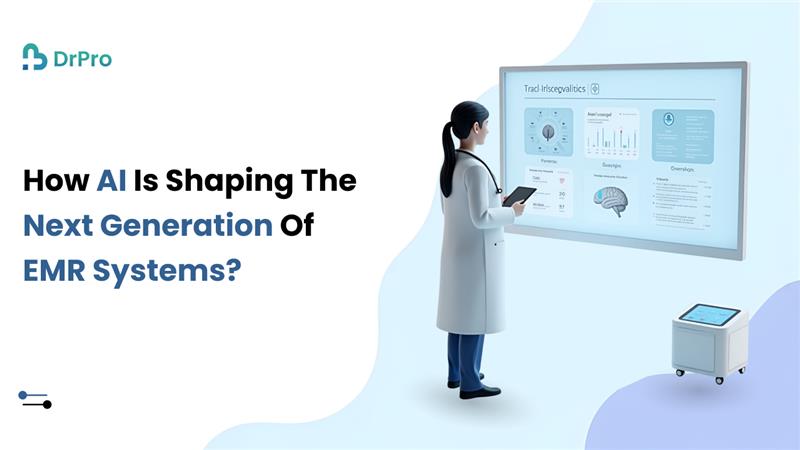Healthcare is changing fast. One of the main causes is the growing use of Artificial Intelligence. Other factors include AI integration in EMR systems that allow doctors, nurses, and hospitals to better manage patient care.
EMR systems have been around for many years. They replaced paper records, making it easy to store patient information. But those systems are now getting smarter. With AI, EMRs are no longer just a digital repackaging of paper records; they become interlocutors in decision making, saving time and improving treatment.
In this blog, we will discuss how AI is driving the next generation of EMR systems and the opportunities presented by AI to both care providers and patients, as well as what is to come.
What is an EMR System?
An Electronic Medical Record system is software used by doctors and clinics for storing patient health records. Depending on the system, such records can include:
- Patient name, age, and contact
- Health history
- Lab testing results
- Medications prescribed
- Doctor’s notes
EMR systems keep everything going into one file so that the doctor can retrieve it easily when necessary.
📲 Follow us on Facebook, Instagram, Twitter, App Store, IOS Store, LinkedIn & YouTube for more wellness tips!
What is AI in Healthcare?
Though computers and similar mechanisms are used to perform work that would ordinarily require human thinking, AI tries to circumvent that need in the healthcare environment by studying large data repositories and detecting patterns so as to give useful suggestions.
When integrated into the EMR system, AI can help by:
- Decreasing working time
- Decreasing errors
- Promoting better treatments
- Helping patients receive better care
Ways AI is Improving EMR Systems
1. Faster Data Entry
Doctors usually spend too much time typing notes.AI helps by:
- Converting speech into text (voice recognition)
- Suggesting words or phrases to complete notes
- Extracting data from previous visits for form auto-fill
This certainly leaves more time for doctors to spend with their patients than with computers.
2. Smarter Clinical Decisions
AI examines patient history to suggest potential problems or treatment options:
- Identifying high-risk patients
- Suggesting test results for review
- Suggesting changes in medication
This makes it easier and quicker for physicians to make well-informed decisions.
3. Predicting Health Problems
AI seeks to use data to predict possible health issues in the future. For instance:
- Someone who has high blood pressure is said to be considered by AI as at risk of getting heart disease.
- In a diabetic patient, it may predict the chances of having kidney disease.
This trick helps doctors to intervene early and stop their patients from developing bigger problems.
4. Reducing Medical Errors
Errors in medicine can prove life-threatening. AI works to decrease the possibilities by:
- Checking for allergies to drugs
- Finding harmful interactions of drugs
- Suggesting the correct dosage
Making the treatment safer for the patients
5. Better Organization of Records
Sometimes finding the information needed in a large medical file is a daunting task. Here AI helps:
- Highlighting relevant notes
- Arranging records by date or health issue
- Displaying the results of tests quickly
It saves valuable time and reduces stress for a doctor.
6. Personalized Care for Patients
Individual patients are not the same. AI could study the data to provide care plans suited to the needs of each individual. It can:
- Suggest a diet and exercise
- Set reminders for medication
- Track recovery progress
The patients feel more supported, and doctors yield better results.
How Clinics and Hospitals Benefit
Empowered by AI, EMR systems give hospitals and clinics several benefits:
- Time saver: Less paperwork needed.
- Cost saver: Fewer errors and repeated tests.
- Better planning: Shows trends with AI and helps care planning.
- Patient coordination: Allows the sharing of patient data among various departments.
How Patients Benefit
AI in EMRs also helps patients by:
- Allowing easy access to appointment and report information.
- Reducing waiting time.
- Providing follow-up care.
- Helping them to track health on mobile apps.
Patients feel more connected and informed about their health.
Challenges in AI-Powered EMR Systems
Although AI does bring much to the table, several resulting challenges must be considered:
1. Data Privacy
Patient data must be kept secure. Strong security systems need to be put in place to prevent data leaks or misuse.
2. High Cost
The setup process for AI-based EMR systems is expensive at the beginning; however, they can save money due to workflow improvements.
3. Training Needs
Doctors and staff will need to find time and have support with the new tools.
The Future of EMR Systems with AI
The EMR system will be powered more by AI. Maybe we will see in the future:
- Patient inquiry AI chatbots
- Wearables that directly send data to EMRs
- Automatic alerts for checkups
- Real-time analysis of patient vitals
As these tools grow, EMRs will become more than mere storage—they will assist in patient care.
More Updates: AI-Based Electronic Medical Records System
Tips for Clinics Thinking About AI EMRs
Here are some tips for a clinic considering the implementation of AI-based EMRs:
- Start small with basic features
- Train your staff well
- Choose a reliable provider
- Make sure the system follows health data rules
Conclusion
AI is paving its way into EMR systems. Formerly, this was just simple storage. Now it is a tool used by doctors to assist patients and turn around the whole healthcare program. Fast data entry, helpful recommendations, and early warnings—this is the input AI has left on the future generation of EMR systems.
With more hospitals and clinics adopting these tools, the care itself will be delivered faster, safer, and more personalized. Platforms such as DrPro are setting the precedent in using AI to improve healthcare for everyone.
FAQs
Q1. What is an AI-based EMR system?
An electronic medical record system that uses artificial intelligence to better assist physicians in managing and understanding patient data.
Q2. How does AI improve EMR systems?
AI improves by rendering data entry quicker, reducing errors, suggesting treatment plans, and assessing health risk.
Q3. Is it safe to use AI with patient records?
Yes, as long as strict privacy regulations are being observed and the data remains secure.
Q4. Can small clinics use AI in EMRs?
Yes, many platforms are offering simple AI tools that are very suitable for small clinics.
Q5. What makes DrPro different?
Rather than your usual slow alerts and other technical jargon, DrPro offers quick alerts, smart notes, and easy-to-use features to help doctors and patients alike use AI.


